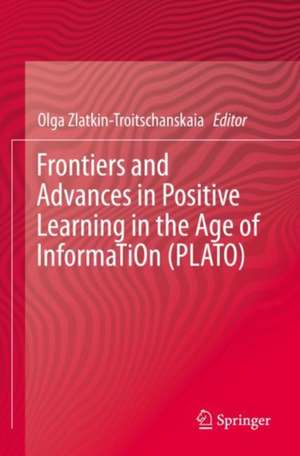Frontiers and Advances in Positive Learning in the Age of InformaTiOn (PLATO)
Editat de Olga Zlatkin-Troitschanskaiaen Limba Engleză Paperback – 26 aug 2021
| Toate formatele și edițiile | Preț | Express |
|---|---|---|
| Paperback (1) | 642.36 lei 43-57 zile | |
| Springer International Publishing – 26 aug 2021 | 642.36 lei 43-57 zile | |
| Hardback (1) | 648.56 lei 43-57 zile | |
| Springer International Publishing – 3 ian 2020 | 648.56 lei 43-57 zile |
Preț: 642.36 lei
Preț vechi: 755.72 lei
-15% Nou
Puncte Express: 964
Preț estimativ în valută:
122.91€ • 128.68$ • 101.70£
122.91€ • 128.68$ • 101.70£
Carte tipărită la comandă
Livrare economică 07-21 aprilie
Preluare comenzi: 021 569.72.76
Specificații
ISBN-13: 9783030265809
ISBN-10: 3030265803
Pagini: 323
Ilustrații: IX, 323 p. 44 illus., 26 illus. in color.
Dimensiuni: 155 x 235 mm
Greutate: 0.47 kg
Ediția:1st ed. 2019
Editura: Springer International Publishing
Colecția Springer
Locul publicării:Cham, Switzerland
ISBN-10: 3030265803
Pagini: 323
Ilustrații: IX, 323 p. 44 illus., 26 illus. in color.
Dimensiuni: 155 x 235 mm
Greutate: 0.47 kg
Ediția:1st ed. 2019
Editura: Springer International Publishing
Colecția Springer
Locul publicării:Cham, Switzerland
Cuprins
Part I: Positive and Negative Learning in Higher Education.- Towards Quality Higher Education: Barriers and Enablers.- The Role of Modeling for “Seeking Truth” in an Educational Policy Classroom.- Critical Thinking in Social Domains.- Part II: Learning with New Media and Technology.- Positive and Negative Media Effects on University Students’ Learning: Preliminary Findings and a Research Program.- Explicating Logic of Biology to Support Critical Thinking.- Picture Bias in Upper-Division Physics Education.- The Role of Media Conversion for Positive Learning.- Part III: Innovative Analytical Approaches for Modeling of Learning.- Towards a Computational Model for Measuring the Complexity of Learning Tasks: A Combined Cognitive and Computational Approach.- Automated Methods for the Comparison of Natural Languages.- Grounding Educational Language: From Situation Modeling to Cognitive Structures.- Successful and Positive Learning through Study Crafting: A Self-Control Perspective.- Literature, Simulation, and the Path towards Deeper Learning.- On the Way of Developing a Holistic Explanatory Model of Positive Learning.- Part IV: Measuring of Intra- and Interindividual Learning – From Neural Correlates to Language Topology.- The Neural Basis of Idea Density During Natural Spoken Language.- What Can the Eyes and the Brain Tell Us About Learning? The Role of Information Density in the Comprehension and Retrieval of Complex Concepts.- IRT Modeling of Decomposed Student Learning Patterns as Positive and Negative Learning in Higher Education Economics.- Performance in Knowledge Assessment Tests from the Perspective of Linguistic Typology.- Challenges in the Modeling and Assessment of Complex Constructs: Some Examples from the PLATO Project.- Part V: Perspectives.- Positive Learning at Risk – Mapping Information Structures of Learning Sources in Economics and Computer Science (PLATO-i).- PLATO in Search of Identity.
Notă biografică
Olga Zlatkin-Troitschanskaia has been Chair of Business and Economics Education at Johannes Gutenberg University Mainz (JGU), Germany, since 2006. She earned her doctoral degree from Humboldt University of Berlin in 2004 and her postdoctoral qualification in 2006. She has published widely on empirical educational research in vocational and higher education. She has directed numerous externally funded national and international research projects and has been coordinating the national research program ‘Modeling and Measuring Competencies in Higher Education (KoKoHs)’ since 2011. Her research has earned various awards and honors. She is a member of many national and international advisory and editorial boards and serves as an expert consultant to ministries, foundations, and international journals.
Textul de pe ultima copertă
Research on students’ media use outside of education is just slowly taking off. Influences of information and communication technologies (ICT) on human information processing are widely assumed and particularly effects of dis- and misinformation are a current threat to democracies. Today, higher education competes with a very diverse (online) media landscape and domain-specific content from sources of varying quality, ranging from high-quality videographed lectures by top-level university lecturers, popular-scientific video talks, collaborative wikis, anonymous forum comments or blog posts to YouTube remixes of discipline factoids and unverified twitter feeds. Self-organizing learners need more knowledge, skills, and awareness on how to critically evaluate quality and select trustworthy sources, how to process information, and what cognitive, affective, attitudinal, behavioral, and neurological effects it can have on them in the long term. The PLATO program takes on the ambitious goalof uniting strands of research from various disciplines to address these questions through fundamental analyses of human information processing when learning with the Internet. This innovative interdisciplinary approach includes elements of ICT innovations and risks, learning analytics and large-scale computational modelling aimed to provide us with a better understanding of how to effectively and autonomously acquire reliable knowledge in the Information Age, how to design ICTs, and shape social and human-machine interactions for successful learning. This volume will be of interest to researchers in the fields of educational sciences, educational measurement and applied branches of the involved disciplines, including linguistics, mathematics, media studies, sociology of knowledge, philosophy of mind, business, ethics, and educational technology.
Caracteristici
Addresses the question of the effect of ICT on human information processing from a broad angle and integrates perspectives from multiple disciplines, while also presenting innovative approaches to their fundamental analysis Moves the educational sciences forward to catch up with today’s learning realities Unearths immense synergetic potentials in the humanities and social sciences, establishing an innovative field of research that will be of significant importance over the next decades
